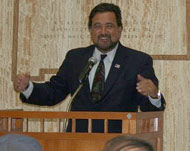3/6/2008
New Mexico Governor Signs Law Limiting Ticket Camera ProfitNew Mexico enacts law diverting photo enforcement profit into state coffers.

New Mexico Governor Bill Richardson (D) yesterday signed legislation limiting the ability of the city of Albuquerque to profit from the use of red light cameras and speed cameras. The legislation was designed to punish the city generating more than $5.1 million in profit from automated tickets that, until recently, ran as high as $400 each. The new law slashes the cost of a ticket to a flat rate of $75 and diverts net profit to the state court system (view bill).
Richardson had vetoed similar legislation last year after Mayor Marty Chavez (D) promised to reform the program by lowering fines on his own initiative. The mayor failed to live up to his end of the bargain before the legislature acted a second time.
"I believe the legislature spoke loud and clear when it overwhelmingly passed this bill for the second straight year," Richardson said in his signing statement. " I am not willing to continue to wait for the city to act."
Although Richardson and Chavez both asserted last year that enactment of the profit limitation measure would spell the end of photo enforcement in Albuquerque, the city is actually under contractual obligation to continue. In 2005 Chavez struck a number of backroom deals with Redflex, the Australian vendor in charge of the program. Among the changes Chavez made was the quiet deletion of the cancellation provision that had been part of the draft contract approved by the city council. Richardson now says that Albuquerque's program can continue to operate from the $5.1 million in cash already collected from motorists. The governor added that he would be open to a legislative change that would allow Chavez to use profits from the ticketing program to boost the city's police and municipal court budgets.
"The city has sufficient money available from the excessive profits from this program to keep the red light program running, if they choose to continue, until the legislature can revisit this issue," Richardson said.
The new law takes effect on July 1.


